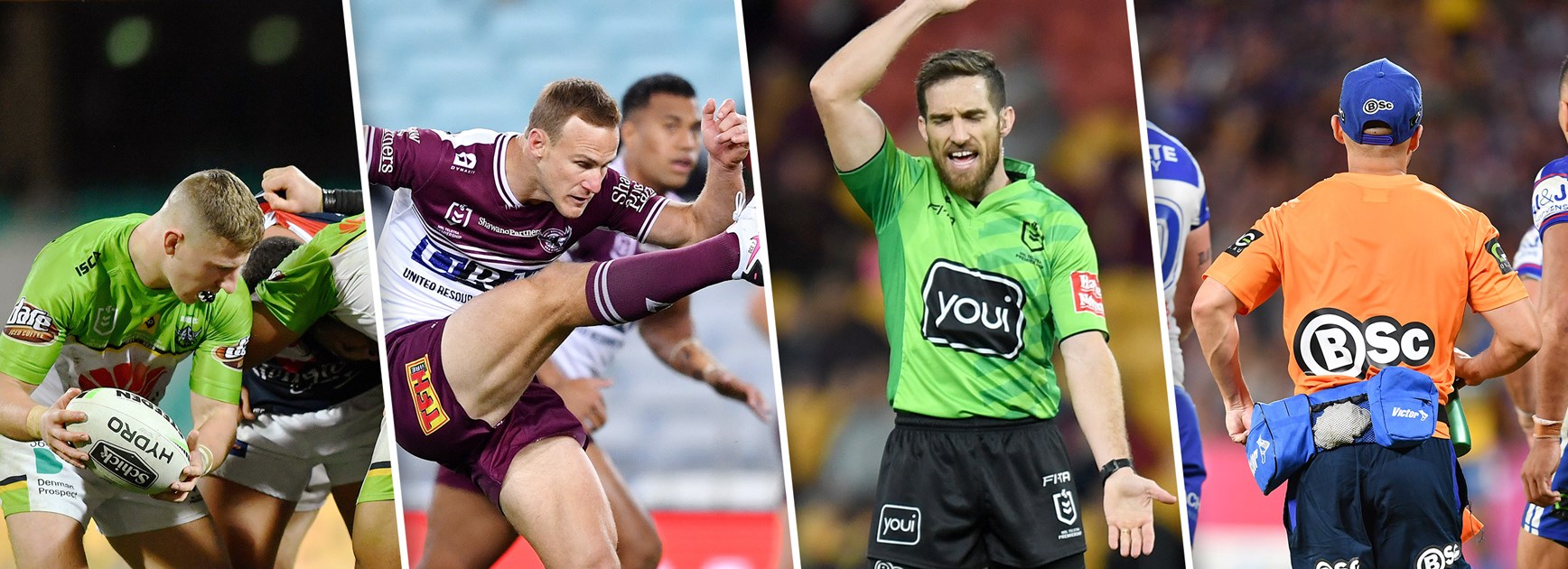
NRL head of football elite competitions Graham Annesley has outlined how new rules will make the Telstra Premiership faster, more free-flowing and unpredictable in 2021.
Teams have played under the new rules announced in December in this year's trial games, with all 16 clubs getting a final pre-season hit-out this weekend.
Annesley told NRL.com that all the recent rule changes have been "about minimising stoppages, increasing the amount of time the ball is in play, increasing the fatigue factor, trying to open up some spaces on the field and making the game more exciting and entertaining to watch".
The rule changes
Two points for field goals outside the 40-metre line
To encourage more unstructured play and increase the chances of a result changing in the final moments of a game, a two-point field goal will be awarded for teams who kick a field goal from outside the 40-metre line.
Why 40-metre field goals now worth two points
The new rule will provide an incentive to seek an additional point scoring opportunity at critical times of a match, particularly with limited time remaining on the clock in each half.
Six Again for 10-metre infringements
To reduce stoppages in the game, 10 metre infringement penalties will be replaced with a "six-again" ruling. Referees maintain the ability to blow a penalty and sin bin a player if a side has made repeated 10m infringements or in the case of professional fouls.
10-metre penalties to be replaced by six-again rulings in 2021
The six-again rule provided a sufficient deterrent for teams who purposely sought a penalty to slow the game down during previous years. This rule was trialled in two games during round 20 of last season. This will result in a fast game, less stoppages and more free-flowing action for fans.
Players to be penalised for breaking from scrums early
Scrums
The ARL Commission determined scrums as part of the game’s DNA. To increase the integrity of scrums, the referee will call "break" when satisfied the ball is out of a scrum.
Players will not be permitted to break from a scrum until the referee makes the call. Where players break before the call of "BREAK", the referee will award a full penalty. The team receiving the penalty will also have the option of re-packing the scrum.
If the scrum is re-packed and players again break early a further penalty will be awarded and one of the offending players will be sent to the sin bin.
Play-the-ball restart after ball or player finds touch
When the ball is kicked or carried into touch play will resume with a play-the-ball rather than a scrum.
Why play-the-ball restarts have replaced scrums when ball goes into touch
This rule was trialled in two games during the final round of last season.
Handover for incorrect play-the-ball
A handover will be ordered where players do not make a genuine attempt to play the ball with their foot.
Why incorrect play-the-balls will now result in handovers
This will ensure greater compliance to the rule and integrity around the play the ball, without increasing penalty stoppages.
Captain’s challenge
In cases where a captain’s challenge review is inconclusive, the on-field decision will stand but the team will retain their challenge.
The change to captain's challenge reviews in 2021
Fans have expressed frustration with teams losing a challenge where replays prove inconclusive, this will ensure a greater opportunity for teams to have challenges available later in matches.
Bunker Reviews
Where the on-field referee believes a try is scored the referee will award a try and the bunker will review the decision in the background. A conversion attempt will not be permitted until the Bunker is satisfied a try has been scored.
Try decisions to be reviewed in background by Bunker
This will ensure even less stoppage time and ensure momentum in the game continues.
This rule was trialled in two games during the final round of last season.
Injured players to be sidelined when play stopped by trainer
Trainers
In 2021, where a trainer asks a match official to stop the game for an injury, the injured player must be either interchanged or taken off the field for a period of two minutes of elapsed game time before he is permitted to resume his place on the field.
This will reduce the number of stoppages for minor injuries.






